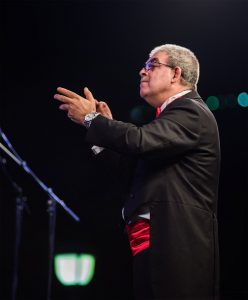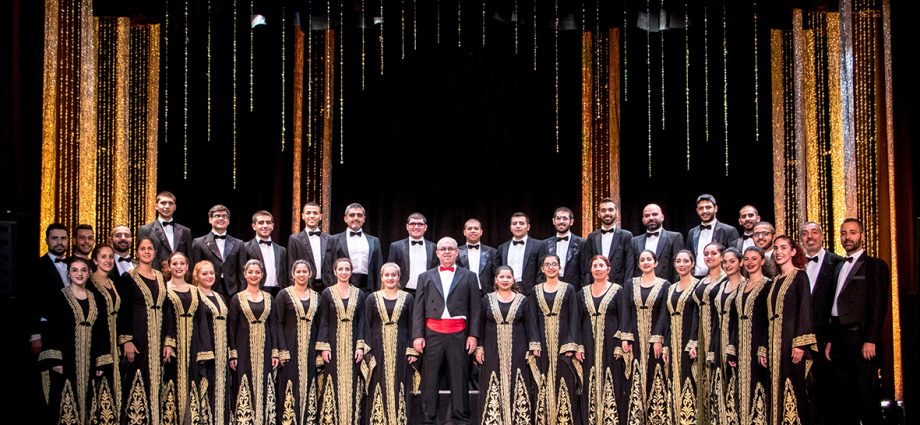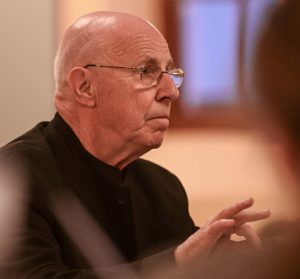Peter Broadbent, Conductor, UK
There are few choral conductors alive who can be credited with creating a tradition but the remarkable Lebanese figure Barkev Taslakian, founder and conductor of the Fayha Choirs in Lebanon and Egypt is one. As a child Barkev was, as he puts it, “not a fan of Arab music, even though I was passionate about music…” Then he heard music composed and performed by Marcel Khalife and the singer Oumeima El Khalil, and he realised that he knew little of the real Arabic music. He soon embarked on a campaign to develop Arabic music “without changing it, and to introduce it to the world in the form A capella” – a form of choral music more or less unknown in the Arabic tradition.

Marcel Khalife heard Oumeima sing as a girl of seven and he was much moved by her voice. But the onset of the Civil War, which was to blight the country for over fifteen years, made it difficult for him to continue his career as a composer, singer and oud player, so he left for France to pursue his career. Returning to Beirut in 1979 he soon invited the 12-year-old Oumeima to perform with his band, Al Mayadin, and this fruitful and regular collaboration has continued ever since, although both also have successful solo careers.
The fourth significant figure in this collaboration is Edward Torikian who took the songs composed by Khalife and arranged them for the Fayha Choir. As Maestro Barkev points out, this was a big challenge for all concerned “given that some Arabic consonants are neither musical or easy to pronounce” when singing. The Arabic Modes, with their microtonal inflections are not easy to convey authentically with a choir but the result makes fascinating listening and the precision of both intonation and rhythm is remarkable.
There are 11 songs on this CD, ranging in length from just under 3 to 11½ minutes, with most around 6 or 7. The magnificent voice of Oumeima El Khalil is at the centre of most tracks, although Muwashah is largely choral. The traditional decoration of the soloist is sometimes echoed by the choir but in general they provide support in terms of rhythmic drive and a wide range of textural variety, polyphonic at times and sometimes in perfect unison. Torikian describes Oumeima’s voice as “soft but steel” and her command over these complex melodies is superb. The slightly breathy but characterful voices of the Fayha Choir demonstrate absolute precision and great energy throughout. The tempo changes within the songs are all handled with great judgement and the control of “Barkev the patient” as Khalife describes him is faultless. In comparison with more traditional forms of choir singing there is a relatively limited range of dynamics in this collection but the intensity and evident sincerity of the performances are not affected by that.
These are very skilful arrangements with some wonderful voice leading and an orchestrator’s touch. In many ways these are a little like folk songs but with a much richer language and greater variety. The ticking of the clock which starts Sa’a gives way to imitative writing then returns as the texture becomes more and more complex and then ends somewhat abruptly, as do many of these songs. The largest scale piece is An Tuhib, a dramatic piece with some stunning decorations from the soloist and a closing melisma with a Picardy 3rd – not at all abrupt here.
What is most missed in this splendid project is any translation of the texts of the songs, or indeed any attribution to the lyricists who provided them, which would help a fuller appreciation of the excellent music making. However, there are some very poetic descriptions in the sleeve notes and a clear sense of the intense emotions and commitment of all the artists responsible for the concept and delivery of the album. It is significant that one of the many awards the Fayha Choir and Barkev Taslakian have received is the Music Rights Award from the International Music Council “in recognition of the choir’s involvement in the social and moral support of refugees through choir singing training.” Lebanon’s Northern border is with Syria and now 50% of the nearly 7 million population are refugees. Their passion for their music is matched by their passion for their country and despite terrible poverty and sometimes appalling living conditions, these singers provide a glimpse of hope for the future of Lebanon.


